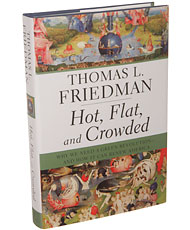 This article was originally published on January 9th, 2009. The global situation hasn’t gotten any better…
This article was originally published on January 9th, 2009. The global situation hasn’t gotten any better…
Go read this book. Right now. Then we’ll talk about it.
OK, now we can dive in. There are few books that I’ve read in recently that have affected me as strongly as this book. A few years ago, I read Thomas’s The World is Flat and found that it was thoroughly researched and its arguments relatively sound and well-presented. He does the same thing in Hot, Flat, and Crowded, and the topic is much more critical then just economic globalization.
In the course of my lifetime (32 years) I’ve watched the idea of being “green” transition from something only aging hippies cared about to something that even big companies are chasing. When I look back on my life, I think it will be one of the defining challenges of my generation. I personally feel that the time to act is now, and that we can’t ignore the massive effects humanity is having on our home planet. What’s exciting is that we have the opportunity to create change – and we must.
Big Thought
The massive changes in social and cultural lifestyles since the Industrial Revolution, accelerated by the modernization of India and China, are threatening to destabilize the viability of our home planet. The United States has an opportunity to harness it’s natural creative and entrepreneurial energies to devise the technology and systems to find solutions to these problems – but only by creating a unified political and economic structure to nurture that process. (Whew, that’s a big thought!)
Ideas, Implications, and Questions
- Thomas argues that, for roughly the past thirty years, the United States has been pursuing a mentality of decision-making that can be described as: “as dumb as we wanna be”. Many of our decisions were simply mortgaging our future so we could do what we wanted to do in the present. And this was written before the market collapse (the one caused by unsound home mortgage practices). Can we continue to act “as dumb as we wanna be”?
- That being said, people will act in their best self-interests. That’s a bedrock of human psychology. You have to create value for someone to change their behaviors and attitudes. It also can’t be only about “10 Easy Ways to Go Green”. This echoes something President-Elect Obama talks about – the need for sacrifice. The current generation isn’t used to sacrifice; all the more reason to show them the value of changing lifestyle choices.
- With the challenges facing the auto industry, I wonder what would have happened if they had been leading the charge to become environmentally sound instead of fighting it. I think what is happening in the auto world (on a large scale) is a great opportunity to see what happens when you resist change. They were definitely mortgaging our future by continuing to make vehicles that were not fuel-efficient; I am curious to see how they respond to the challenges of the present moment. What if all the auto workers were retrained to make wind-power generators and solar panels? That would be interesting, but it also gets to Thomas’s point that by re-tooling and leading the world into the “Green Age”, the U.S. could maintain and strengthen its global leadership role.
- The total cost of energy is described as the total cost to make energy once you’ve added in the costs of the externalities (which are usually excluded) like pollution. It makes me think that there are often choices we make in our personal lives in which we don’t take account of the “total cost”. Would we still work and live in a certain way if we knew it was damaging our long-term relationships with our families or friends? For example, would parents work long hours to buy their child a certain lifestyle if they knew that it also had costs stemming from their absence?
- I used to think that we needed a Manhattan Project-like effort to develop a clean energy source. Thomas makes a convincing argument, one that swayed me, that the best chance we have is to have many, many smaller actors working on the project from many different angles. This will have the best chance of finding the right answers. Because, unlike the Manhattan project, there isn’t a clear endpoint that we are searching for and a clearly defined problem that we are trying to solve (environmental problems are not caused by Nazis). It reinforces that we need to create an economic environment that encourages this intellectual entrepreneurship.
- I thought about how the nature of being eco-conscious compares with the Zen path I study, which is much more introverted. But Zen evolved in an environment where humans couldn’t kill the Earth as we know it. I’m reminded of the title of the book by Katagiri Roshi, You Have to Say Something. I think that the Zen practice of mindfulness to the present moment is a useful one in the ecological journey, because the fact that we haven’t been aware of the present moment (and the costs of what we were doing to the planet) are what got us into this mess. It will help guide our actions, because we have to act.
Should you read this book?
Go back and read the first line. Why do I think you should read this book? Because the more intelligent, articulate, motivated people we have focused on this challenge, the more likely we are to be up to that challenge and that’s a good thing. I love a quote that Thomas uses at the end of the book:
“We have exactly enough time, starting now.” (pg 412)
